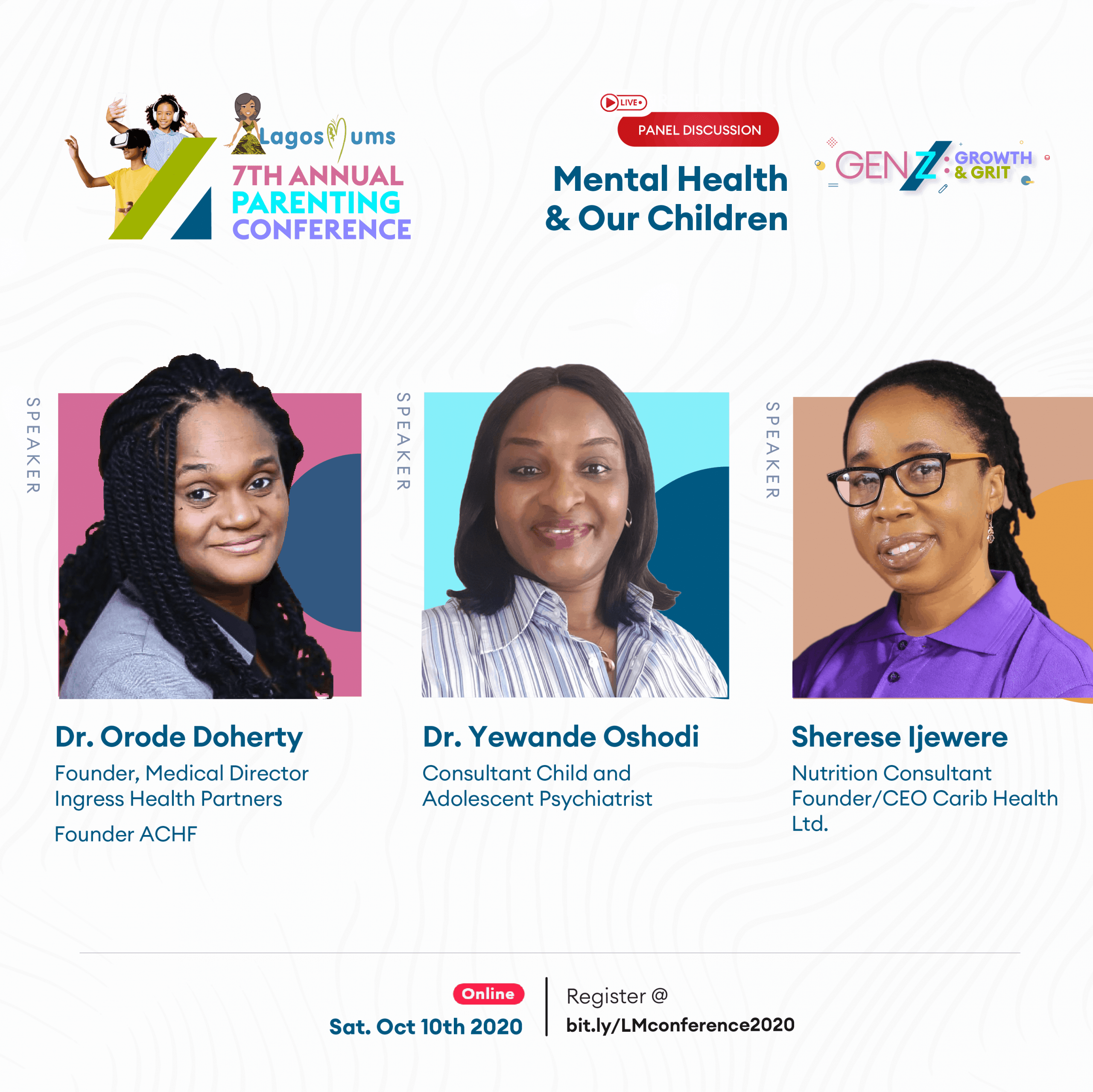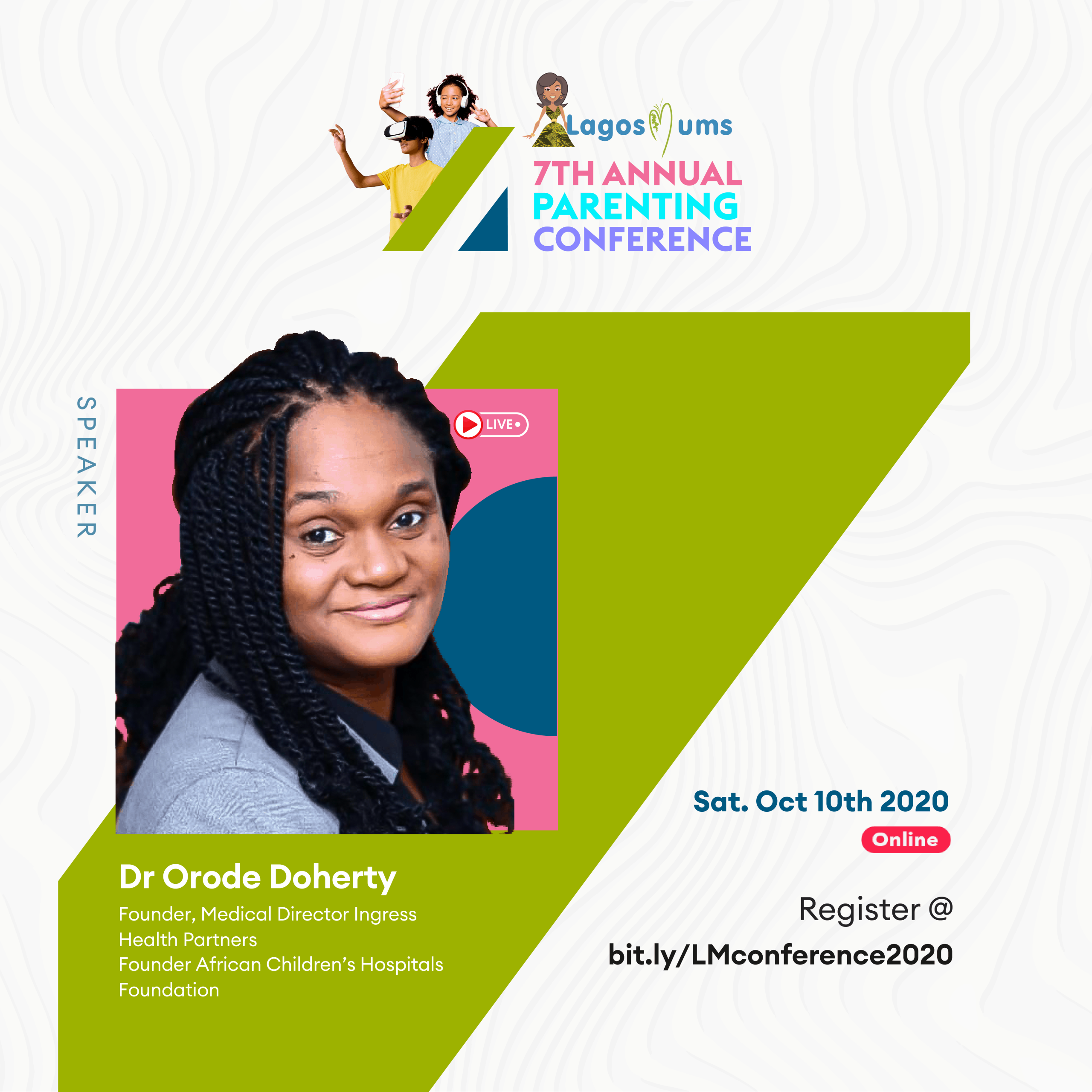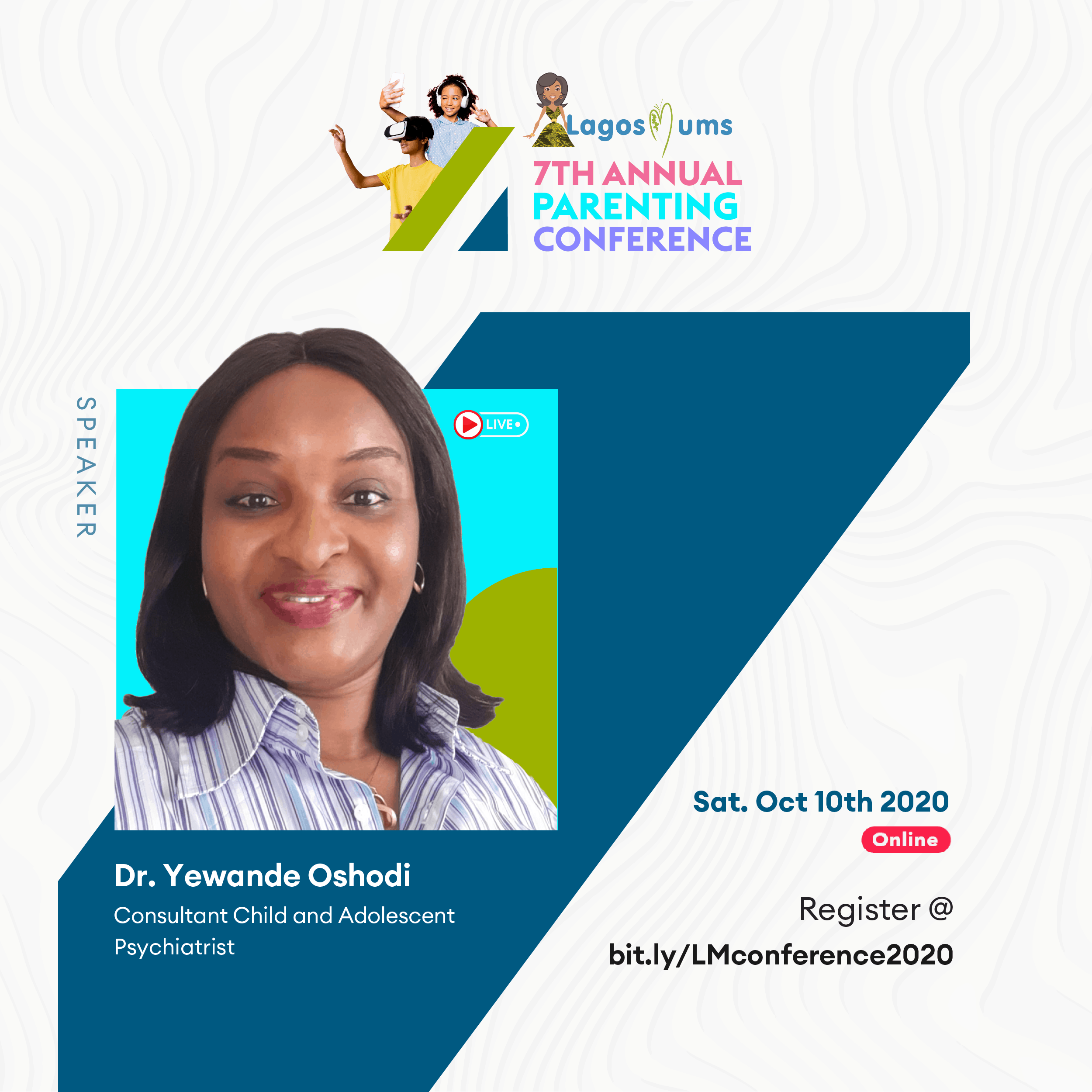As individuals, parents, and society, the state of our mental health, and most importantly, that of our children should be of great importance to us. With the COVID-19 pandemic still very rampant, and families trying to keep safe; the adverse effects of these changes in movement, social interaction, and so on could be strenuous to the mental health of the younger ones. At our 7th Annual Parenting Conference, which was held on the 10th of October 2020, we had a panel discussion, which featured three wonderful speakers who shed light on how to ensure the mental health of our children.

The panel discussion featured three of our speakers, in persons of Dr. Orode Doherty, the founder and Medical Director of Ingress Health Partners; Dr. Yewande Oshodi, she is a consultant child and adolescent psychiatrist; Mrs. Sherese Ijewere, she is a nutrition consultant, and the founder/CEO of Carib Health Ltd. They all gave us a view on mental health, how it affects our children, how to curb mental health issues; and how to promote good mental health.

Dr. Orode Doherty

Dr. Doherty affirms that this generation seems to be experiencing a lot more mental health issues than the generations before them. Also that the questions we need to ask are: Are we more aware and savvy now? Do we have more knowledge around when something has begun to deviate from normal? Because there is a continuum of behavior; where children who have gone from just being very quiet, to then becoming depressed or just being easily aggravated or angry; to having outbursts that are considered psychotic.
Effect of the Pandemic
Dr. Doherty shared that the pandemic allowed us to understand the importance of mental health; redefining health around wellness and not just sickness. She thinks the pandemic helped us to understand our teens and adult sense as she has three Gen Z’s and that they are a Gen Z family. She states that teenagers are very social creatures and they need one another, almost more than parents at the teenage stage; they need their friends. We as parents have to become creative about ensuring that they could get the kind of stimulation they need. She states that after a while, her 16-year-old craved his kind of interactions, and he needed to be safely able to engage with his peers. And they had to start coming up with ways to ensure that beyond FaceTime on the gadgets, we could get them in open space.
She also stated that the pandemic revealed unfortunately the poor health literacy in Nigeria; as people didn’t know where to go, or how to access the help that they identify they needed, most people were panicking because they were stuck. Stuck at home, stuck with a situation that we couldn’t jump out and go solve; so many people didn’t resort to the telephone initially until they realized it was a tool that was used to call up a doctor, we were like deers in headlights. She stated that apart from depression, all the other things are the good normal continuum of teenage behavior that showed up in a glaring way to parents. And it took a while for parents to see, we were on this train you just didn’t realize it. Now we need to ride carefully and make sure we get off at the right station.
Signs of Mental Health Issues Parents should notice
She states that up to half of the children who will develop mental health issues will do so in their teens between the ages of 14 and 15; we see about 50% of them will begin to manifest. And parents have to recognize the continuum of normal; recognizing when things are normal and when they become abnormal. Children, unfortunately, may experience the first loss of a classmate when they become teenagers; children who don’t then come out of it, or have a prolonged period of mourning have to be identified by the parents; parents have to get them into care so that they can grieve normally to avoid negative speeches that lead to mental health issues.
Read Also: [Why your Teenagers health is Important]
Parents can show support and foster care to their children by showing unconditional love. If a child has been diagnosed with whatever, it should not change the way love is expressed and given to the child. Unconditional love from the family, siblings, and extended family is an important part of the children growing up, and we must identify that children who have misgivings about whether they are loved, accepted or wanted, are more likely to have issues with mental health
Dr. Yewande Oshodi

Effects of the Pandemic on mental health
Dr. Oshodi stated that oftentimes when it comes to the pandemic, society is thinking about the jobs and adults; in which the children and adolescents are invisible, we don’t seem to realize that all these things have effects on them. She states that child and adolescent mental health is the ability of a child to have a sense of identity and self-worth; have sound family, and peer relations, and ability to be productive in their own space at their level. These are the important things that formed their mental health. Such that any fragmentation of any of this results in their mental health being challenged. So the pandemic brought quite a few mental health issues to the fore; feelings of loneliness and isolation puts them in a space where some children don’t communicate to their parents or parents not communicating with their children.
She stated also that apart from the isolation and all, children were stuck with anxious and distressed parents, therefore, the children’s anxiety feeds off of the parent’s anxiety; because they have learned to model anxiety that their parents give off knowingly or unknowingly. And the other thing is that disruption of services for children with special needs; children that require well structured individualized educational programs lost that opportunity. She stated that we must be mindful of watching out for the mental health, distress signs that a child may show up with that maybe haven’t shown before.
Mrs. Sherese Ijewere

Role of Nutrition in Optimal Mental Health
Mrs. Ijewere states that the food children eat is important to their mental health. Many parents complained that their children were constantly eating, and part of those complaints also led to things like them developing diabetes; and also them always sitting down. This in turn led to the child feeling a bit down, with the pandemic and lockdown as well. So, sitting down always indoors, not going outside, as parents were trying to see how we can work around things. She also stated that what we as parents are feeding our children should help them to retain what they’re learning and their mental health.
She said they find that our teenagers are following these trends in terms of eating out a lot, eating more of fad diets that contribute to the way that they feel emotionally. Staying indoors, not going out to get Vitamin D, to get a bit of those hormone that also helped to pick up their mood. We also see that inflammatory foods, nutrient-deficient foods, cause an issue with mental health disorders, and many times it’s us as parents that are not realizing what we’re giving our children; we’re ordering out, buying this and that, we’re trying to keep the home stable and happy, and just not realizing what we’re doing to our children.
Food to Promote Mental Health for Gen Z
She stated there are some important brain health foods for Gen Z. Like carrots, potatoes, berries, green vegetables, and importantly water; and so importantly, being intentional being mindful about taking these items. As families, eating together often is makes a difference. Parents should also be good examples for their children with their eating habits. Mental Health also includes things like being physical, making sure that you get exercise as a family. Maybe you can put one of the children in charge of exercise as a positive way to develop mental health; whether it’s jumping jacks or whatever it is, they will be on top of you about it. So setting the example is so important. Being observant with your children paying attention to different things
Click HERE to watch the full conference on our Youtube channel
Read Also [Why is Adolescent Health Care Important]


